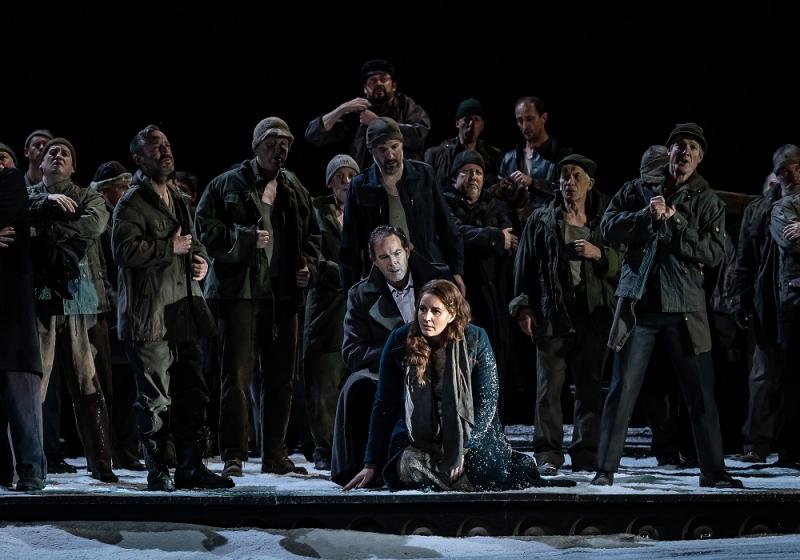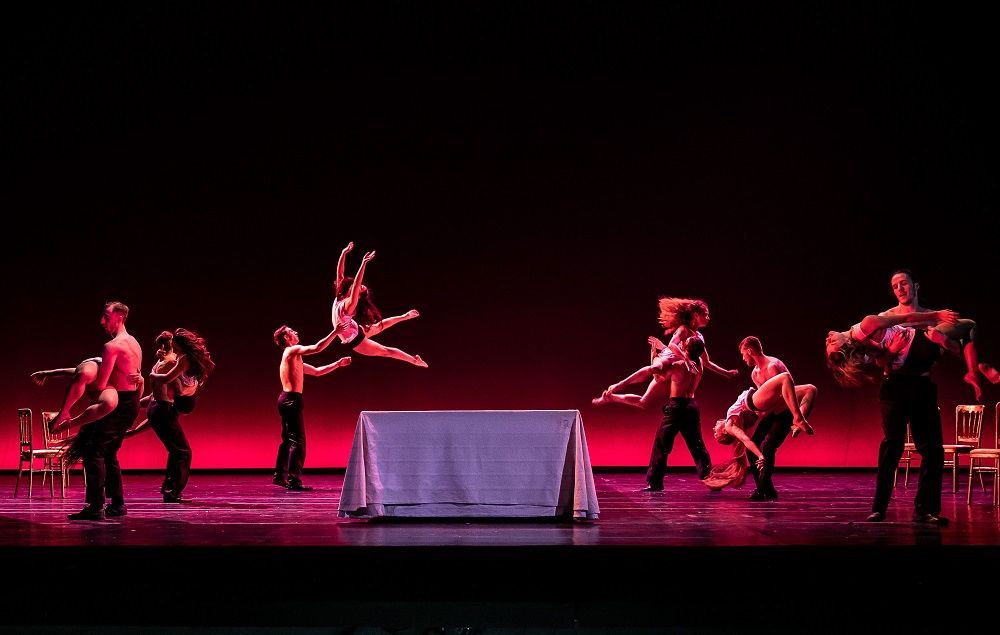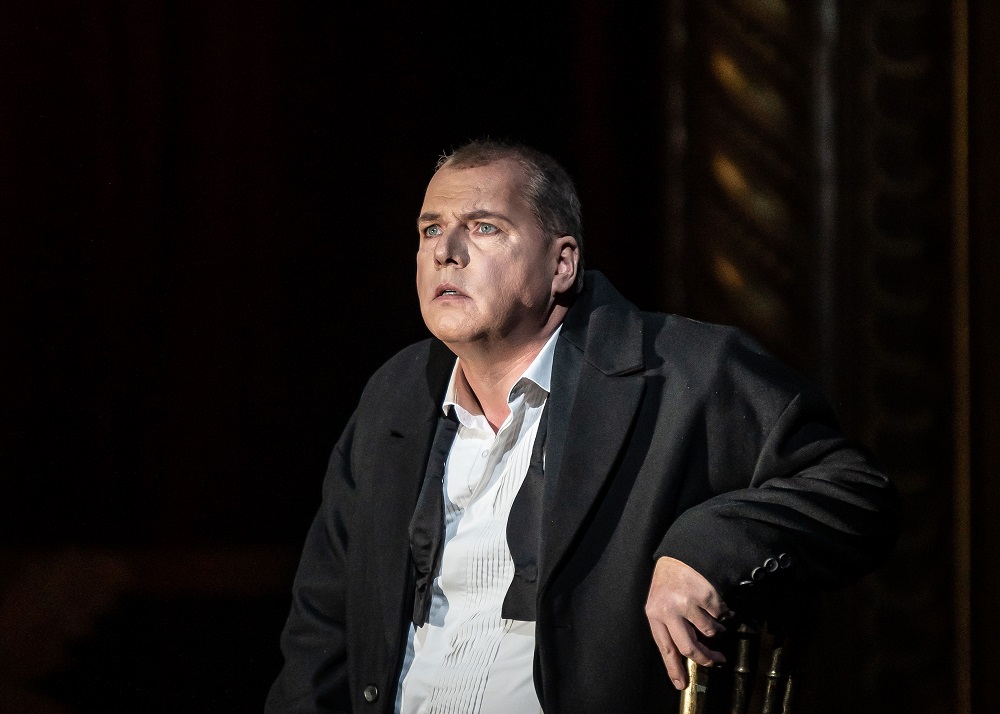Tannhäuser, Royal Opera review - true goodness triumphs in the end | reviews, news & interviews
Tannhäuser, Royal Opera review - true goodness triumphs in the end
Tannhäuser, Royal Opera review - true goodness triumphs in the end
Lise Davidsen's fully-realised Elisabeth is no pallid virgin in this mixed revival

It’s always a disappointment when the Venusberg orgy Wagner added in 1861 to his original, 1845 Tannhäuser to suit Parisian tastes gives way to foursquare operatic conventions. Especially so in this revival of Tim Albery’s 2010 production, where Jasmin Vardimon’s choreography (pictured below) seems executed with more brilliance than ever and post-viral vocal problems loomed large last night for this hero.
The static nature of the rest of the evening, though, - Wagner’s problem, accentuated by Albery, though his living tableaux are well managed - is redeemed by exceptional singing-acting from Lisa Davidsen and Gerald Finley, matched by exquisite colours in Act Three from the Royal Opera Orchestra under Sebastian Weigle, a helpfully stage-conscious conductor already distinguished by fine recordings of Strauss and early Wagner from Frankfurt.  From the beginning of Act Two onwards, the opera could be called Elisabeth rather than Tannhäuser, at least in Davidsen’s fully-rounded characterisation. She doesn’t have glowing surroundings to react to; it looks as if the war which the Landgave announces as over, in ideally authoritative bass tones from Mika Kares, still afflicts a decimated Wartburg. But her almost girlish raptures about Tannhauser’s return, true love, it seems, are all the more powerful when he bursts out at the song-competition in praise of the sensual pleasures he’s experienced. Davidsen’s is no pallid virgin. The impact as expressed in her powerful physical reaction makes this seem like a rape; the fellow songsters’ tributes to sacred love may have come across as wet and weedy – though three harps and tenor Egor Zhuravskii, recently graduated from the Royal Opera’s Jette Parker Young Artists Programme, do their very best to gild insipid music – but the polar opposite really does seem like more than a slap in the face.
From the beginning of Act Two onwards, the opera could be called Elisabeth rather than Tannhäuser, at least in Davidsen’s fully-rounded characterisation. She doesn’t have glowing surroundings to react to; it looks as if the war which the Landgave announces as over, in ideally authoritative bass tones from Mika Kares, still afflicts a decimated Wartburg. But her almost girlish raptures about Tannhauser’s return, true love, it seems, are all the more powerful when he bursts out at the song-competition in praise of the sensual pleasures he’s experienced. Davidsen’s is no pallid virgin. The impact as expressed in her powerful physical reaction makes this seem like a rape; the fellow songsters’ tributes to sacred love may have come across as wet and weedy – though three harps and tenor Egor Zhuravskii, recently graduated from the Royal Opera’s Jette Parker Young Artists Programme, do their very best to gild insipid music – but the polar opposite really does seem like more than a slap in the face.
We feel at a visceral level the sheer effort of Elisabeth’s pleading for Tannhäuser to do penance and seek salvation; the powerful ensemble has even more of an impact as a result. And we sense a woman longing only for death in the Act Three prayer. This wonderful sequence which enfolds it, vintage Wagner by any standards, comes with perfect playing from Royal Opera horns – also carefully articulating in the Overture – and woodwind, and as finely sung a hymn to the evening star from Gerald Finley’s Wolfram as you could hope to hear (which is saying something when Christian Gerhaher stole the show in 2010).  Veteran, battle-scarred heroic tenor Stefan Vinke impresses in a different way as the minstrel with the divided soul (pictured above). At Sunday’s first performance, he was ailing, the part sung from the side of the stage while he acted it out. Last night, in the hard-to-love interchanges with Ekaterina Gubanova’s serviceable Venus, the voice turned to pure gravel in the second of his song-apostrophes to carnal love. But it recovered, and despite the dread occasioned by an announcement at the beginning of Act Two that he was continuing in adverse circumstances, everything rang out at the song competition and he got through the narrative of the Pope’s refusal to pardon such a sinner in Act Three. You didn’t get the sense that this was a soul in agony, but Vinke may have been marshalling his resources.
Veteran, battle-scarred heroic tenor Stefan Vinke impresses in a different way as the minstrel with the divided soul (pictured above). At Sunday’s first performance, he was ailing, the part sung from the side of the stage while he acted it out. Last night, in the hard-to-love interchanges with Ekaterina Gubanova’s serviceable Venus, the voice turned to pure gravel in the second of his song-apostrophes to carnal love. But it recovered, and despite the dread occasioned by an announcement at the beginning of Act Two that he was continuing in adverse circumstances, everything rang out at the song competition and he got through the narrative of the Pope’s refusal to pardon such a sinner in Act Three. You didn’t get the sense that this was a soul in agony, but Vinke may have been marshalling his resources.
Act Three’s other glory was the Pilgrims’ Chorus, so quiet when the Royal Opera singers came on stage that I couldn’t tell if there were still more in the wings. Kudos to the lusty-voiced children at the end, too – uncredited in the programme, unless I’m much mistaken – and to the shepherd-boy of Jette Parker newcomer Sarah Dufresne, managing to mix treble sounds with real lyric-soprano beauty. The circumstances were top quality, and I liked Albery’s production more, even if I still don’t quite grasp the Venusberg as meta-theatre behind a second set of Royal Opera proscenium arch and curtains; our very own gateway to hell, perhaps? And though this is the ultimate bad-binary opera – sensuality bad, holy love good – it left me feeling more whole than I’d expected during the longueurs of the first act.
rating
Explore topics
Share this article
Add comment
The future of Arts Journalism
You can stop theartsdesk.com closing!
We urgently need financing to survive. Our fundraising drive has thus far raised £49,000 but we need to reach £100,000 or we will be forced to close. Please contribute here: https://gofund.me/c3f6033d
And if you can forward this information to anyone who might assist, we’d be grateful.

Subscribe to theartsdesk.com
Thank you for continuing to read our work on theartsdesk.com. For unlimited access to every article in its entirety, including our archive of more than 15,000 pieces, we're asking for £5 per month or £40 per year. We feel it's a very good deal, and hope you do too.
To take a subscription now simply click here.
And if you're looking for that extra gift for a friend or family member, why not treat them to a theartsdesk.com gift subscription?
more Opera
 Le nozze di Figaro, Glyndebourne review - perceptive humanity in period setting
Mostly glorious cast, sharp ideas, fussy conducting
Le nozze di Figaro, Glyndebourne review - perceptive humanity in period setting
Mostly glorious cast, sharp ideas, fussy conducting
 Fidelio, Garsington Opera review - a battle of sunshine and shadows
Intimacy yields to spectacle as Beethoven's light of freedom triumphs
Fidelio, Garsington Opera review - a battle of sunshine and shadows
Intimacy yields to spectacle as Beethoven's light of freedom triumphs
 Dangerous Matter, RNCM, Manchester review - opera meets science in an 18th century tale
Big doses of history and didaction are injected into 50 minutes of music theatre
Dangerous Matter, RNCM, Manchester review - opera meets science in an 18th century tale
Big doses of history and didaction are injected into 50 minutes of music theatre
 Mazeppa, Grange Park Opera review - a gripping reassessment
Unbalanced drama with a powerful core, uninhibitedly staged
Mazeppa, Grange Park Opera review - a gripping reassessment
Unbalanced drama with a powerful core, uninhibitedly staged
 Saul, Glyndebourne review - playful, visually ravishing descent into darkness
Ten years after it first opened Barrie Kosky's production still packs a hefty punch
Saul, Glyndebourne review - playful, visually ravishing descent into darkness
Ten years after it first opened Barrie Kosky's production still packs a hefty punch
 Così fan tutte, Nevill Holt Festival/Opera North review - re-writing the script
Real feeling turns the tables on stage artifice in Mozart that charms, and moves
Così fan tutte, Nevill Holt Festival/Opera North review - re-writing the script
Real feeling turns the tables on stage artifice in Mozart that charms, and moves
 La Straniera, Chelsea Opera Group, Barlow, Cadogan Hall review - diva power saves minor Bellini
Australian soprano Helena Dix is honoured by fine fellow singers, but not her conductor
La Straniera, Chelsea Opera Group, Barlow, Cadogan Hall review - diva power saves minor Bellini
Australian soprano Helena Dix is honoured by fine fellow singers, but not her conductor
 The Queen of Spades, Garsington Opera review - sonorous gliding over a heart of darkness
Striking design and clear concept, but the intensity within comes and goes
The Queen of Spades, Garsington Opera review - sonorous gliding over a heart of darkness
Striking design and clear concept, but the intensity within comes and goes
 The Flying Dutchman, Opera Holland Park review - into the storm of dreams
A well-skippered Wagnerian voyage between fantasy and realism
The Flying Dutchman, Opera Holland Park review - into the storm of dreams
A well-skippered Wagnerian voyage between fantasy and realism
 Il Trittico, Opéra de Paris review - reordered Puccini works for a phenomenal singing actor
Asmik Grigorian takes all three soprano leads in a near-perfect ensemble
Il Trittico, Opéra de Paris review - reordered Puccini works for a phenomenal singing actor
Asmik Grigorian takes all three soprano leads in a near-perfect ensemble
 Faust, Royal Opera review - pure theatre in this solid revival
A Faust that smuggles its damnation under theatrical spectacle and excess
Faust, Royal Opera review - pure theatre in this solid revival
A Faust that smuggles its damnation under theatrical spectacle and excess
 Pygmalion, Early Opera Company, Curnyn, Middle Temple Hall review - Rameau magic outside the opera house
Welcome opportunity to catch opera-ballet, though not everything is in perfect focus
Pygmalion, Early Opera Company, Curnyn, Middle Temple Hall review - Rameau magic outside the opera house
Welcome opportunity to catch opera-ballet, though not everything is in perfect focus

Comments
Wonderfully said. Just one
Thanks - I'll correct that.
Thanks - I'll correct that. Brainslip. Sorry that the take on Weigle has generally been a bit so-what, because like you I thought his handling of timbre was masterful, right from the start of the Overture.